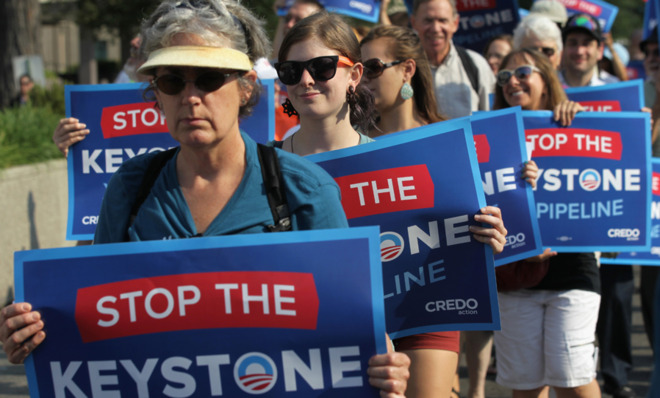Debunking 5 Keystone pipeline myths
No, America doesn't need Keystone's oil


A free daily email with the biggest news stories of the day – and the best features from TheWeek.com
You are now subscribed
Your newsletter sign-up was successful
On Friday, the State Department announced that it had no environmental objections to the controversial Keystone XL pipeline that would bring Canadian oil to Gulf Coast refineries. Predictably, that news is being cheered by the "drill, baby, drill" crowd, which sees the announcement as vindicating its pro-drilling position, and attacked by the greenies, who think Obama's talk of fighting climate change is a farce.
As usual, there's more to it than simplistic bumper-sticker opinions. Here are some of the biggest myths about Keystone:
1. Keystone will define Obama's legacy on climate change. The West Wing has a much different view: The real contributor to global warming is carbon emissions from coal-fired power plants, and the administration, through the Environmental Protection Agency, is using regulations to close scores of these polluters. Other power plants are quickly switching to natural gas, which still has a carbon footprint, but not nearly as bad as coal. Obama also likes to boast of doubling renewable energy and higher mileage standards for vehicles. Even if he were to approve Keystone (a final decision is still perhaps a year away), he'll try and trade it for something else the green crowd is clamoring for, perhaps an end to $4 billion in oil industry subsidies.
The Week
Escape your echo chamber. Get the facts behind the news, plus analysis from multiple perspectives.

Sign up for The Week's Free Newsletters
From our morning news briefing to a weekly Good News Newsletter, get the best of The Week delivered directly to your inbox.
From our morning news briefing to a weekly Good News Newsletter, get the best of The Week delivered directly to your inbox.
2. America needs Keystone's oil. We really don't. Production in the U.S. has surged to record levels on Obama's watch, while imports have fallen sharply. As recently as 2008, we imported 9.8 million barrels of oil a day, according to the Energy Information Administration. By 2012 that number had fallen to 8.5 million barrels. And we're now on track to pass Saudi Arabia as the world's top oil producer in the next two years or so — with or without Keystone.
3. Keystone's oil will be used here at home. This is one of the bigger canards. We're awash in gasoline now and can't use all have — which explains why refiners are exporting it by the boatload, literally. Refined products like gasoline and jet fuel are now one of America's biggest exports; we even send gasoline to the Middle East. Such exports have tripled in the last decade.
4. America needs Keystone because gasoline prices are at an all-time high. Sigh. Such ignorance. Gasoline prices (AAA national average) peaked in the United States at $4.11 in July 2008, six months before Obama became president. That's about $4.60 in today's dollars. But wasn't gasoline just $1.85 or so when Obama took over? Yes, because it plunged 55 percent as the U.S. economy collapsed in the fall of 2008. As the economy has recovered, restoring demand, prices have risen about 77 percent to Sunday's AAA average of $3.28.
5. Obama is to blame for gasoline prices. If you blame Obama for gasoline prices rising 77 percent in five years, then who do you blame for it rising 179 percent from 2002 to 2008? When George W. Bush took took office, Americans paid about $1.47 a gallon; by July 2008 it hit $4.11 (again, about $4.60 adjusted today for inflation).Oil and refined products like gasoline are global commodities; to suggest that any one man — be it Obama or Bush — can dictate prices is nonsense. It was disingenuous for Democrats to play the blame game then, and it's equally lame for Republicans to do so now.
A free daily email with the biggest news stories of the day – and the best features from TheWeek.com
An award-winning member of the White House press corps, Paul Brandus founded WestWingReports.com (@WestWingReport) and provides reports for media outlets around the United States and overseas. His career spans network television, Wall Street, and several years as a foreign correspondent based in Moscow, where he covered the collapse of the Soviet Union for NBC Radio and the award-winning business and economics program Marketplace. He has traveled to 53 countries on five continents and has reported from, among other places, Iraq, Chechnya, China, and Guantanamo Bay, Cuba.
-
 Political cartoons for February 16
Political cartoons for February 16Cartoons Monday’s political cartoons include President's Day, a valentine from the Epstein files, and more
-
 Regent Hong Kong: a tranquil haven with a prime waterfront spot
Regent Hong Kong: a tranquil haven with a prime waterfront spotThe Week Recommends The trendy hotel recently underwent an extensive two-year revamp
-
 The problem with diagnosing profound autism
The problem with diagnosing profound autismThe Explainer Experts are reconsidering the idea of autism as a spectrum, which could impact diagnoses and policy making for the condition
